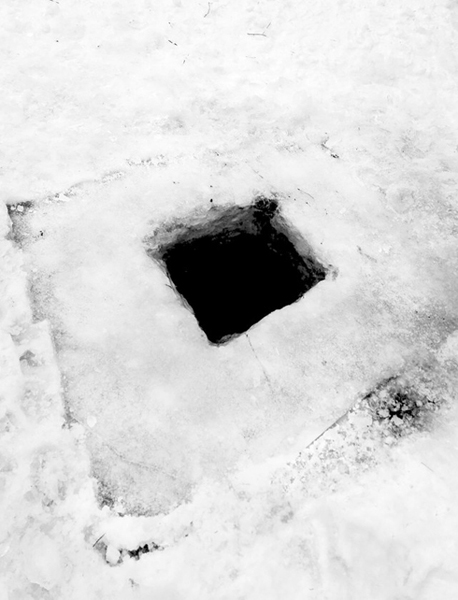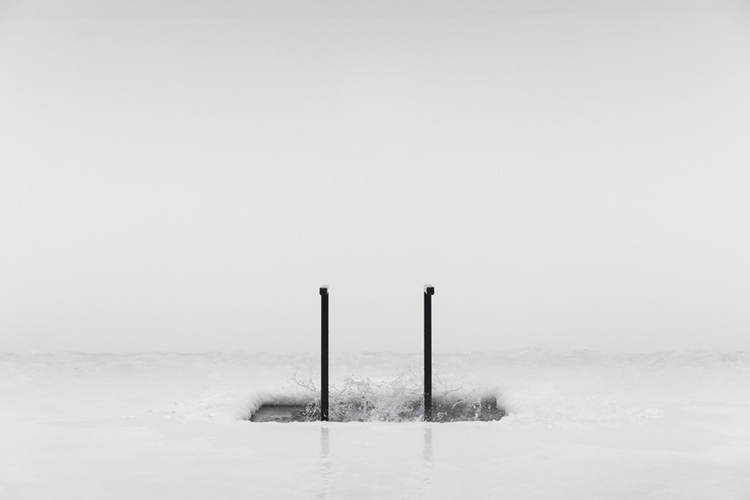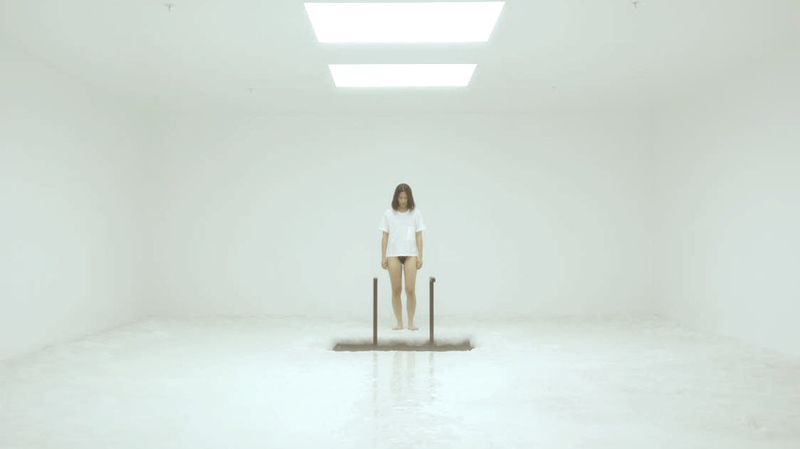Taryn Simon’s Temptation
Lyn Horton
June 2018

A Cold Hole, Courtesy the artist, MASS MoCA, and Matti Koivula
On March 26, 2018, MASSMoCA celebrated its summer season at an opening of two installations and bookwork of artist, Taryn Simon. The works fill nearly the entire first floor of the museum.
One installation piece is called A Cold Hole, as shown in the first photo at a different venue. The installation at MASSMoCA is the subject of this article.
This work requires actual participation to be realized for what it is. At the opening, three persons took part. The action is to drop into a pool of ice-cold salt water the opening of which is eight-foot square. The fifteen-foot-deep tank of water is imbedded in a large white room whose floor is packed with rough hewn ice and whose temperature is kept cold enough so that the ice does not melt.
The audience for this event views the participant through perhaps a nine by fifteen-foot movie screen-proportioned window whose bottom edge is about sixty inches off the floor. The window is carved out of a wall in a room that is totally black, the reverse aesthetic of the room where the pool is located.
I witnessed a young woman, a young man and the Director of the museum drop into the hole.
The young woman wore only a white t-shirt and her black underwear. Her hair was also black. She was of Asian descent. I did not count the minutes she stood in front of the hole. But she stared straight ahead for quite a while, her arms aligned with her body. She shook her hands to relax her arms and shoulders as if she were preparing to mount a starting block from which she would dive for a swimming race. Her eyes and head were directed towards the space in front of her; she talked to herself a bit and then did not move.
Taryn Simon, A Cold Hole, 2018, As installed in Taryn Simon: A Cold Hole | Assembled Audience
(MASS MoCA, North Adams, MA, on view May 26, 2018), Courtesy Taryn Simon Projects, Photo: Jack Criddle
In an unpredictable moment, she simply fell into the hole in front of her, disappearing for seconds until her head bobbed up and was visible between the rails of the ladder mounted on the far side of the hole. Her mouth was open, she moved her hair back from her face with her right hand as she climbed out of the hole. She walked forward to the window, turned left and vanished from view.
The second person to ‘take the plunge’ seemed far more easy-going. He was older than the woman who preceded him. He wore no shirt and only a pair of belted shorts. He was heftier than the young woman, who was tiny, actually, in comparison. He stood for a short period of time in front of the hole, his head tilted, chin to his chest, as he stared into the pool. And in an instant, he, too, disappeared into the water. His exit was substantial and affirmative.
It was surprising to discover that the Director of MASSMoCA, Joe Thompson, participated in this piece, but, in reflection, it makes perfect sense. Of course, he would. He is the ultimate participant in everything at the museum.
I saw Joe enter the cold room from the hall walking on a black metal slotted pathway leading from another room. His focus was palpable. A herd of people, including me, rushed into the area for watching his descent into the water.
There was Joe, visible right behind the window looking at his watch before he marched to the hole. He was wearing a suit and tie and shoes. When he took his place behind the hole, he looked at his watch again. He removed his glasses and tucked them into his jacket’s chest pocket; he tapped the pocket to secure them.
He folded his arms across his chest and heart, palms down, in a position of submission. Within less than thirty seconds, he was in the water. And then out. Fully standing in front of the railing, he put his glasses on and walked straight towards the window, peered through, made no gestures, turned left and disappeared behind the black wall.
Stunned, I stayed there in the darkness looking through the window, vicariously imagining what it felt like to do what these people had done. It was like an episode in a production of a living theater piece.
Two people suggested that I participate in this event. I mulled that idea over for a couple of days. I found the internet address where I could make an appointment. Two were available. I stared at the screen of my tablet before I filled in the requested information. But I shied away from clicking the ‘submit’ button. Later on, that same Sunday, I went back to the appointment page. The time I originally wanted was taken. I distracted myself again from making an appointment. A few hours later, I returned to the appointment page; only one time slot remained. I filled in information again about myself and clicked the submit button. I had followed through. Two weeks in advance.
During those two weeks, I tried to determine what entering the saltwater pool would be like, based on what I had witnessed. The thought of it intercepted my routine thoughts periodically. I even practiced turning the shower knob quickly all the way to cold, after bathing in warm water, and standing from my neck down in streaming cold water for ten seconds. Every time, my system would be shocked by the sudden change in temperature and I would groan, but, by the count of five, my body was accustomed to the cold.
I even believed that continuing to read Walk Through Walls, Marina Abramović’s autobiography, would help me to understand how to muster the strength to withstand physically and emotionally an unusually dramatic circumstance.
The Friday before I was to go to MASSMoCA, I exercised on my stationary bike for a normal twenty minutes, the equivalent of three miles. This provided me with enough serotonin to avert the anxiety of the upcoming event. I followed my normal day in my studio.
Saturday, June 9, at 12:30 pm. My appointment at A Cold Hole.
I lay in bed awake at 7:30 am, finally pulling back the covers to leave the bed and sit on the floor to meditate for nearly forty minutes.
I went downstairs to have breakfast. It occurred to me to postpone regular house cleaning activities because I had to leave by 11:15 am in order to be at the museum a little early. Postponing cleaning was useless. It was all I could do to thwart the anxiety that was building. Music streamed off the Internet on a 24-hour jazz station out of Washington state.
After my morning routine was finished, I skedaddled out of the house, remembering to feed the cat before going through the door to the car. I decided not to eat anything.
I stopped at the Post Office on the way out of town.
It was a beautiful day. The drive to the museum was really quite peaceful until I reached Adams even though the traffic was not bad for a weekend. I arrived at the museum, parked, and grabbed my bag, containing the clothes I was to wear as per instructions of the team of people handling the event; locked the car; and walked through the parking lot to the museum lobby. One of the receptionists at the entrance directed me to the man at the information booth, who directed me again through the doors to the first-floor gallery where the Simon exhibition is installed. I did not have to show my membership card to gain entrance to the museum.
Standing in front of a door to the right as I walked into the galleries were two women, carrying clipboards of attached lists of scheduled participants. I checked in and was asked to wait for ten minutes before conferring with them.
I saw a girl walk down the wire footpath from what must have been a dressing room to the cold room. I went quickly to the viewing room to watch her drop into the water. She was clothed in a long white diaphanous dress. Her hair was blond and cut close to her head. She appeared a wash of consistent pale color.
She stood calmly behind the hole, her arms at her side. She looked up at the ceiling and circled her head to gaze around the large room. Her physical presence did not interrupt the whiteness of the environment.
Finally, she looked down at the hole, not taking much time before she dipped headlong into the water. Her face appeared above the level of the ice floor quickly. As she rose, her dress was clinging to her small body. Her nakedness had been revealed. She walked to the window, picked up the skirt of her dress slightly with her left hand, signaling a bit of embarrassment; turned left and was gone.
I swallowed hard knowing that I was next.
I walked back to the dressing room entrance and waited for her to exit. When she did, two girlfriends chattered at her and then enquired as to how she felt: “Are you cold?” one friend asked to which she replied: “No.” She was unrattled.
One of the event’s managers called me into the dressing room. I turned to follow her inside. I sat down. With a soothing demeanor, she handed me a couple of disclaimers to sign, including one which described the risks of what I was about to do. I read it carefully. The words described drastic possible scenarios, including death. I had to confirm that I was over eighteen and healthy and could swim. As I signed my name on the form, I said out loud: “I can’t believe I am doing this.” The woman who was speaking to me said: “Take your time.”
She described in detail how I was to enter the water, complete with illustrations. And then she said: “Will you show me the clothes you plan to wear?” I pulled a pair of black leggings and a white exercise top out of my bag. She wanted to be sure that I was not going to wear my ‘street’ clothes in the water. Then she directed me to choose, from a selection of differently sized black foot pads, a pair to wear on the bottoms of my bare feet so I would not slip on the ice. The two women left the dressing room, shut the door, allowing me to change clothes. I did so. I had trouble peeling the backing off the adhesive non-skid foot pads and mounting them to my feet because, one, I was nervous, and, two, I did not have my glasses on. They were in the car.
On the outside, I was ready to go. But internally, I harbored deep trepidation and, paradoxically, wonder.
I took a breath, opened the door to the black walkway, walked to the heavy black tinted door, opened it, crossed the threshold and there I stood, next to a seated female EMT, facing the ice floor.
When I stepped onto the ice, lightheadedness seized my body from my head to my toes. My steps along the path I was told to walk were careful and slow. The ice was rough and had small peaks and valleys I had to negotiate to maintain my balance.
I reached the back edge of the hole and stopped, turned, faced forward and stayed. My hands touched my thighs. My longer than shoulder-length hair brushed across my cheeks as I looked down into the cavity that was the tank that held the water. I could see the ladder.
The surface of the water seemed thick like oil. The steady ripples in one thin horizontal line close the back edge of the opening caught the light from above. The two square-shaped skylights were reflected on the surface; the lights were the only means to discern the shine of the metal ladder through the pit of blackness between me and the other side of the hole.
I had read none of the artist’s words mapping out her intentions behind the design of A Cold Hole or explanations why she chose to borrow it from other cultures and magnify its existence in this installation.
This quickly became my own uneducated singular experience.
As I looked into what can be characterized as an abyss, a source of mystery and a path to the unknown, I meditated. The room hummed. The whiteness surrounding me expanded like a balloon. The cold embraced me as would warmth because it was outside of the hole, the place I was to go before leaving the room. I had committed myself to taking that literal step, although I could have backed off at any time. There was a vast distance between stepping into the water and not. That distance was purely psychological.
The hole tempted me to go in but at the same time repelled me. It tempted me for the reason that I was curious about the water once sunk into it. It repelled me for the reason that as I stood there, every fear of every trauma I have ever suffered paraded through my meditative state. I was totally present with my fears. I was totally present within myself. The hole and I were the only two elements that existed in that moment, exclusive of anything and anyone else. Going into the hole meant transcending the stupefying trepidation laid bare in one short twelve inches between me and it.
I crossed my hands over my chest as Joe had done. I had been inhaling and exhaling methodically since I had taken my place. My heart was beating so fast that I took time to try to slow it down biorhythmically in my meditation. As I attended to that process though, the pace only increased. I did not know what to do.
The idea that my balking would cause the EMT to retrieve me crossed my mind. I decided that I would succeed. Failure was not an option.
A foam pad was placed on the very edge of the hole. I stepped onto it. The cold of the room intensified. My legs started to shiver. I was overwhelmed. I bent my knees slightly to relax my legs. A kind of other awareness told me to do that.
I knew that I was about to go into water. I still could not understand how I would get there. And, then, something happened. A clarity of nothingness pervaded my entire being; I moved my right foot forward, the other followed; I moaned loudly and I was in the water. My body had entered straight, I thought. When I opened my eyes, I was on the left side of the tank; my limbs felt like they were detaching from my trunk. They flailed around until I saw the metal ladder. My left hand found the left rail. I pulled myself around so that both hands were engaged in exiting the hole. I felt one step with my left foot and then began to ascend but missed a step with my right foot. I pulled it off the ladder and found the correct step to push on. I kept on going instinctually until I was out of the water and standing on the ice. I never noticed how cold the water was.
My connection with the upper world resumed just as I started walking towards the window, which was a very slow-moving journey. When I reached the window, a number of people who had been watching me began to clap loudly. I could only see one woman clearly through the glass looking directly at me. The rest were merely hazy silhouettes. I smiled.
I turned left and stepped towards the exit where the EMT was still sitting. I stopped and said: “That was the hardest thing I have ever done.” She said: “I know. You were standing there for fifteen minutes.”
The amount of time that had passed seemed to me to be merely a couple of seconds. I had reached Nirvana. The power of Nirvana had ushered me into the water in the hole.
No preparation for this exceedingly private experience is possible.
Only being swallowed by the water for the first time is.

Taryn Simon, A Cold Hole, 2018, As installed in Taryn Simon: A Cold Hole | Assembled Audience
(MASS MoCA, North Adams, MA, on view May 26, 2018), Courtesy Taryn Simon Projects
____________________________________________________________________________________________
Lyn Horton has been an artist for over forty years dedicated to maintaining a whole life experience now more than ever. She has a long history writing about creative improvised music for well-known publications, reviewing recordings, interviewing musicians and composing editorials. She has exhibited her art work extensively and is represented by the Cross MacKenzie Gallery in Washington, D.C. Horton was commissioned in 2012 to do a piece for the US Embassy in Vientiane, Laos. Her photography can be seen on Instagram.
Read other articles by Lyn Horton on Arteidolia:
More Than Seven Steps: Nick Cave at MASS MoCA
The Sol LeWitt Principle: Wall Drawing Retrospective at MASS MoCA

